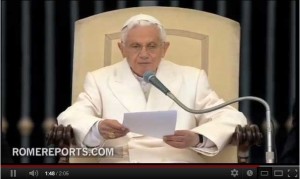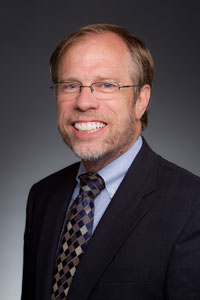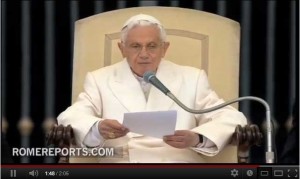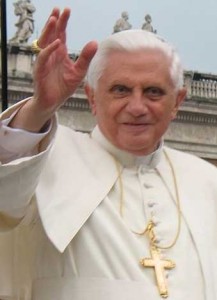(Vati can Radio) What really satisfies man’s deepest desire? Is the desire for God absurd, irrational in today’s secularised world? How do we reach out to people who have lost their faith? To people who do not believe in God? How do we accompany them on their search for true good? These were the questions Pope Benedict XVI posed to 30 thousand people in St Peter’s Square for the Wednesday general audience, the third in his series for the Year of Faith.
can Radio) What really satisfies man’s deepest desire? Is the desire for God absurd, irrational in today’s secularised world? How do we reach out to people who have lost their faith? To people who do not believe in God? How do we accompany them on their search for true good? These were the questions Pope Benedict XVI posed to 30 thousand people in St Peter’s Square for the Wednesday general audience, the third in his series for the Year of Faith.
Listen:[powerpress]
The answer, Pope Benedict XVI said, lies in rediscovering the real meaning of human desire, ecstasy and love. In rediscovering our taste for the joys of life.
“We must believe that even in our era, seemingly reluctant to the transcendent dimension, that it is possible to open a path toward an authentic religious meaning of life, showing how the gift of faith is not absurd, it is not irrationalâ€
Below please find a Vatican Radio translation of Pope Benedict XVI’s general Audience catechesis, the third in his series on the Year of Faith:
Dear brothers and sisters,
The journey of reflection that we are making together this Year of Faith leads us to meditate today on a fascinating aspect of the Human and Christian experience: man carries within himself a mysterious desire for God. In a very significant way, the Catechism of the Catholic Church opens with the following consideration: “The desire for God is written in the human heart, because man is created by God and for God; and God never ceases to draw man to himself. Only in God will he find the truth and happiness he never stops searching for”(No. 27).
Such a statement, which even today in many cultural contexts seems quite acceptable, almost obvious, might instead appear as a provocation in the sphere of secularized Western culture. Many of our contemporaries could, in fact, argue that they do not feel such a desire for God at all. For large sectors of society He is no longer desired, expected, but rather a reality that leaves some indifferent and not even worth wasting one’s breath over. Actually, what we have defined as “desire for God†has not completely disappeared and still today, in many ways, appears in the heart of man. Human desire always tends towards certain tangible assets, which are often far from spiritual, and yet it is still faced with the question of what “the†good really is and as a result confront itself with something other than itself, something that man cannot create, but is called upon to recognize. What can really satisfy man’s desire?In my first encyclical, Deus caritas est, I tried to analyze how such dynamism is experienced in human love, an experience which in our era is more easily perceived as a moment of ecstasy, of going beyond oneself, as a place where man senses that he is being filled with a desire that is beyond him. Through love, men and women experience in a new way, thanks to one another, the grandeur and beauty of life and of reality. If what I experience is not a mere illusion, if I really want the good of the other as a path towards my own good, then I must be willing to de-centralize myself, to put myself at the service of the other to the point of surrendering myself. The answer to the question about the meaning of the experience of love thus passes through the cleansing and healing of the will, which is required by the very good we want for the other. We have to practise, train and even correct ourselves so that that good may be truly wanted. (more…)
Tags: pope benedict xvi, year of faith
This entry was posted on Wednesday, November 7th, 2012 at 2:17 pm
You can follow any responses to this entry through the RSS 2.0 feed.
From Vatican Radio:
[powerpress]
“In a world where individualism seems to regulate relationships between people, rendering them increasingly fragile, faith calls us to be people of God, to be Church, and bearers of God’s love and communion for all mankind”, said Pope Benedict XVI Wednesday as he continued his general audience catechesis on the ‘Act of Faith’, more familiarly known as the ‘Creed’. Emer McCarthy reports:
Despite foreboding skies and sharp temperatures, the audience was held in St Peter’s square. In off the cuff comments to the thousands who withstood the drizzle huddled under umbrellas to hear the Pope’s words, Benedict XVI noted ‘it could be worse’.
Last week the Pope had spoken of how we have seen that faith is something intensely personal: a gift of God which transforms and enriches our life. But, he asked this Wednesday: “If faith is of a purely personal, individual character? Does it only affect me personally? Do I live my faith alone?â€
In comments in Italian Benedict XVI said : “The answer is found in Baptism, when the priest asks the person to be baptized if he believes in God the Father, Jesus His only Son and the Holy Spirit. The “I do” with which we answer “is not the result of my solitary reflection, it is not the product of my own thoughts, but it is the result of a relationship, a dialogue in which there is a listening, and receiving and response; it is communicating with Jesus that takes me out of the “I” that is enclosed in on myself to open up to the love of God the Father. It is like a rebirth in which I find myself united not only Jesus, but also all those who have walked and walk on the same path; and this new birth, which begins with Baptism, continues throughout the course of my existence. I can not build my personal faith in a private dialogue with Jesus, because faith is given to me by God through a community of believers, the Church, and I a become part of the multitude of believers in a community that is not only sociological, but rooted in the eternal love of God. ”
Tags: nicene creed, pope benedict xvi, year of faith
This entry was posted on Wednesday, October 31st, 2012 at 5:15 am
You can follow any responses to this entry through the RSS 2.0 feed.
(Vatican Radio) On Wednesday Pope Benedict XVI began the second installment in his general audience catechesis on faith, by putting a series of questions to the thousands of pilgrims and visitors to St Peter’s Square. He asked them: What is faith? Does faith still make sense in a world where science and technology have opened new horizons that were, until recently, unthinkable? What does it mean to believe today? Emer McCarthy reports
[powerpress]
These “unrelenting†questions, he told them, are typical of the world today of “a certain kind of culture, has educated us to move only within the horizon of things, of the feasible, to believe only what we can see and touch with our hands. On the other hand, the number of people who feel disoriented is growing and, in seeking to go beyond a purely horizontal reality, they are willing to believe anything and its direct oppositeâ€.
But, added the Pope, these questions also reveal that despite the “greatness†of our human discoveries, we need and want more than the simply tangible. We need and are looking for “love, meaning and hope, a sure foundation, a solid ground to help us live with an authentic sense even moments of crisis, darkness, difficulties and daily problems. Faith gives us just that: it is a confident trust in a “You”, that is Godâ€.
Below a Vatican Radio translation of the Holy Father’s general audience catechesis:
Dear Brothers and Sisters,
last Wednesday with the start of the Year of Faith, I began a new series of catechesis on faith. Today I would like to reflect with you on an elementary question: What is faith? Does faith still make sense in a world where science and technology have opened new horizons that were, until recently, unthinkable? What does it mean to believe today? In fact, in our time what we need is a renewed faith education, which includes a certain awareness of its truth and the events of salvation, but that mainly arises from a real encounter with God in Jesus Christ, from loving Him, trusting him, so that our entire life is involved.Today, along with many signs of good, a sort of spiritual desert is growing around us. Sometimes, the events we hear about in the news every day, give us the feeling that the world is not projected toward building a more fraternal and peaceful community; the very ideas of progress and well-being show their darker shadows. Despite the greatness of the discoveries of science and the breakthroughs of technology, today man does not seem to have truly become freer, more humane; there are still many forms of exploitation, manipulation, violence, oppression, injustice … Moreover a certain kind of culture, has educated us to move only within the horizon of things, of the feasible, to believe only what we can see and touch with our hands. On the other hand, the number of people who feel disoriented is growing and, in seeking to go beyond a purely horizontal reality, they are willing to believe anything and its direct opposite. In this context, some fundamental questions emerge, which are much more concrete than they appear at first sight: What is the meaning of life? Is there a future for the man, for us and for future generations? Where should we direct the choices of our freedom for a successful and happy life? What awaits us beyond the threshold of death? (more…)
Tags: pope benedict xvi, year of faith
This entry was posted on Wednesday, October 24th, 2012 at 9:40 am
You can follow any responses to this entry through the RSS 2.0 feed.
What a delight to have the chance once again to talk with Gregory Erlandson, president and publisher of  Our Sunday Visitor  Publishing, one of the finest resources out there for nurturing our faith.  Greg has that wonderful “eagle-eye”  view of not only all things Catholic, but of the world as a whole and he uses it to help see how we can fit into our society and culture as faithful believers.
Publishing, one of the finest resources out there for nurturing our faith. Â Greg has that wonderful “eagle-eye” Â view of not only all things Catholic, but of the world as a whole and he uses it to help see how we can fit into our society and culture as faithful believers.
It was great to discuss not only current events affecting the Church today, but also the greater need for interior renewal which is the true “fuel” for the New Evangelization.  Faith is ultimately about a relationship with God.  He warns us that being lukewarm in our faith can be deadly for the Church.  That we can  become such weak witnesses that we bear only the name Catholic, which unfortunately can cause disillusionment or even scandal in the hearts and minds of those around us.  Therefore, the New Evangelization needs to begin with each of us personally.  When that renewal happens, we will then be a Church that can authentically and vibrantly witness our  life-giving  faith to world badly in need of the Gospel message.
[powerpress]
Our Sunday Visitor has so many fantastic resources to nurture that relationship, whether your at home with the kids or working out in the world, a catechist/DRE or a pastor trying to reach out to your families through the internet, OSV can add in that “connection”.
 Click here to find out more on their website osv.com
Click here to find out more on their website osv.com
Tags: new evangelization, osv, our sunday visitor, year of faith
This entry was posted on Friday, September 21st, 2012 at 7:48 am
You can follow any responses to this entry through the RSS 2.0 feed.


